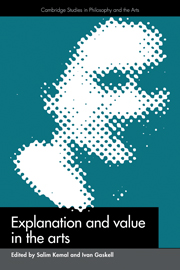Book contents
- Frontmatter
- Contents
- List of contributors
- Editors' acknowledgments
- 1 Interests, values, and explanations
- 2 Fiction and reality in painting
- 3 Franz Kafka: the necessity for a philosophical interpretation of his work
- 4 On relocating ethical criticism
- 5 Explanation and value: what makes the visual arts so different, so appealing?
- 6 Is art history?
- 7 Objectivity and valuation in contemporary art history
- 8 Fullness and parsimony: notes on creativity in the arts
- 9 Principles of a sociology of cultural works
- 10 Althusser and ideological criticism of the arts
- 11 Film, rhetoric, and ideology
- Index
7 - Objectivity and valuation in contemporary art history
Published online by Cambridge University Press: 24 February 2010
- Frontmatter
- Contents
- List of contributors
- Editors' acknowledgments
- 1 Interests, values, and explanations
- 2 Fiction and reality in painting
- 3 Franz Kafka: the necessity for a philosophical interpretation of his work
- 4 On relocating ethical criticism
- 5 Explanation and value: what makes the visual arts so different, so appealing?
- 6 Is art history?
- 7 Objectivity and valuation in contemporary art history
- 8 Fullness and parsimony: notes on creativity in the arts
- 9 Principles of a sociology of cultural works
- 10 Althusser and ideological criticism of the arts
- 11 Film, rhetoric, and ideology
- Index
Summary
Contemporary art history is rife with anxiety. As in so many of the humanistic disciplines entrusted with the understanding, care, and transmission of culture, this anxiety is really a manifold of concerns masquerading as unitary under the rubric of “the crisis.” However, all genuine crises have multiple structural determinants and the crisis in art history is no different. The disciplinary integrity and productivity of the field is being challenged on epistemological, metaphysical, historical, political, and feminist grounds. In this essay I will be concerned not directly with any of these problems, but with yet another vector of the crisis, the relation between art historical practice and the value of art works. In my investigation of this particular dilemma, I am claiming neither that it is primary nor that it is isolated, but I will treat it as discrete and hope that I do not thereby drastically distort its nature.
Analogically, the crisis of value in art history has the same structure as the parable of the emperor's invisible clothes. Much of the legitimacy and prestige of the art historical enterprise is derived, in an Arnoldian fashion, from the inherent value of the object domain of the discipline. But, again as in so many of the humanistic disciplines, there is a creeping concern that rather than the custodial work uncovering the sources of value in art, the custodial work itself is instead precisely where value is generated.
- Type
- Chapter
- Information
- Explanation and Value in the Arts , pp. 127 - 145Publisher: Cambridge University PressPrint publication year: 1993



